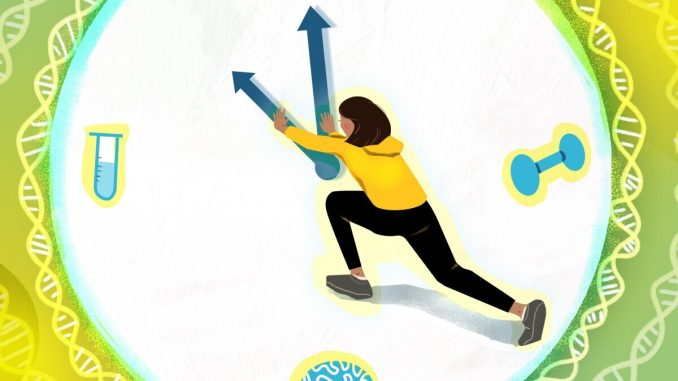
Research now allows us to redefine the pattern of a downward spiral: ageing. As molecular biology, genetics and regenerative treatment proceed even from today even more gray hairs will be popped out in the future. Nutrients uncovered in these studies suggest not only a way to live longer, but: for those who survive into their twilight years of sorts (and to state the very least) that extra years is something enjoyable too! Well, let’s take a look at what scientists recently found out about aging, vitality and health.
At the core of aging is cellular senescence, a process in which functions and structures are slowly downgraded over time. Because the cells can not divide, repair themselves or regenerate, at some point or other things begin to go haywire due to damage in their DNA, proteins and so forth. One of the chief culprits is oxidative stress, where reactive oxygen species (ROS) wreak havoc on cells in this way. Studies show that by reducing oxidative stress, it is possible to slow aging; hence antioxidants have been considered anti- aging agents.Slowly but surely the story about telomeres, these protective caps on the ends of chromosomes, is being revealed.
Over the years, as cells divide, their telomeres shorten eventually leading to cell death. Scientists have been looking for ways to keep these small things going. This might involve activating an enzyme called telomerase, which could in theory reverse cellular aging.Genetic FactorsGenes also play a role in longevity. A study of centenarians found that some genetic variations, especially those linked to inflammation, metabolism and DNA repair, are more commonly found in people who live longer than 100 years. One example is the FOXO3 gene which has been shown to be beneficial in terms of increased lifespan in both humans and animals. Although research into using gene editing or other treatments to influence these genes is still in its early phase, there is significant potential.
The article, The Impact of Lifestyle on Aging, points out that the effects of genetics on aging are fixed while choices in lifestyle can open many different doors to the future. How we eat, how we exercise and the character of our inner lives all help determine not only how long we will live (lifespan) but also whether, during those years..
Caloric Restriction and Fasting: Studies have shown that caloric restriction without malnutrition can extend the lifespans of laboratory mice. Other researchers are investigating whether this is also true for humans. Caloric restriction activates specific genetic pathways such as the sirtuin family of proteins which help repair DNA and keep cells healthy. Subsequently, alternatives ranging from Intermittent Fasting (‘IF’) to complete fasting have attracted interest since they may stimulate autophagy, a process whereby the body rids itself of damaged cells and damaged mitochondria.
Exercise: Sustained, regular physical activity has long been seen to slow the aging clock. It increases the number of mitochondria (small power plants inside cells) and decreases inflammation characteristic of old age. Not only that! If you exercise, ECU is healthier because exercise promotes the production of Brain Derived Neurotrophic Factor (BDNF). This is a protein which not only helps keep your mind sharp, it holds back the years too.
Mental Health: While there may be a direct relationship between cognitive decline and aging, the more important truism is that mental health is the key to slower aging. It has been shown that people who stay socially connected, continue to challenge their minds, and deal better with pressures such as mindfulness tend to age more slowly. On the other hand, chronic stress speeds up cellular aging by shortening telomeres and by stirring up inflammation.
Future Anti-Aging Methods
As our understanding of aging and its mechanisms grows ever more detailed, scientists are looking for newer ways to slow or even reverse the aging process.
Senolytics
These are medicines specifically targeted at and get rid of senescent cells. These build up in our tissues as time wears on the years come. They play a central part in aging diseases. Early animal experiments have shown that removing these cells can stop tissues from weakening, and also can prolong life. But more research is urgently needed.
Regenerative Medicine
We are practicing therapy in which stem cells repair damaged tissues and organs–a goal for the future. We are figuring out how to replace older, sick cells with young replacements ones reflecting inner vitality. New directions for life in old age are a sure thing. Advances in 3D printing and tissue engineering also make waves in the field of regenerative medicine. They offer hope as a potential source for organ replacement in human life studies future.
Metformin and Rapamycin
Both of these drugs, originally developed for other medical ailments, are showing promise in increasing lifespan. Metformin, used to treat diabetes, seems to improve metabolic health and reduce inflammation, while rapamycin— an immunosuppressant— turns off the major pathway of aging (mTOR).
The Future of Aging Research
Aging research is a fast-developing field–for example, genes and epigenesis epigenetic how environmental factors impact hereditary expression, or microbiome studies that examine possible ways that gut flora could influence longevity and health. However, the move toward individualized treatment could offer fresh options to the complexities of aging. It will be an anti-aging strategy tailored for each person’s genetic make-up.
In conclusion
Aging is no longer necessarily an unavoidable slide into poor health, as shown by recent research results. Scientists believe that by understanding the biological, genetic and environmental aspects of aging, it will not only be possible to add years onto one’s life but improve the quality of those same extended periods. While science has yet to find a way of attaining eternal life, the investigation and application of anti-aging research peddles new hope altogether for those who grow old. Much expanded longevity and vigor can now be expected.